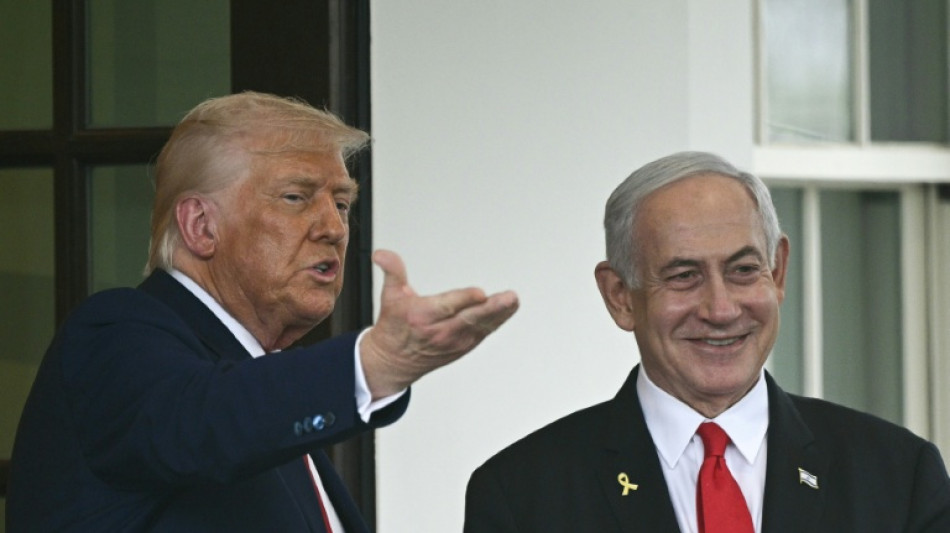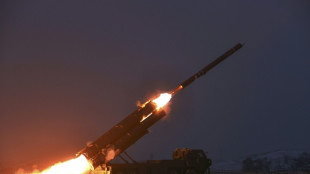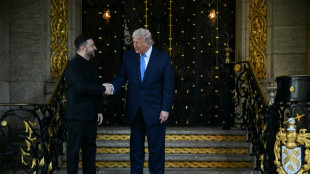
Netanyahu's other battle: swinging Trump and US behind Iran war

Since launching air strikes on Iran last week, Israeli Prime Minister Benjamin Netanyahu has been working to pull President Donald Trump into the war, and sway a sceptical American public.
In his daily calls and public statements, Israel's longest-serving prime minister has mixed praise and deference for the US leader, while also arguing that the strikes on Iran benefit Americans.
"Do you want these people to have nuclear weapons and the means to deliver them to you?" he asked during an interview on Fox News last Sunday.
"Today, it's Tel Aviv. Tomorrow, it's New York," he told ABC News a day later, arguing that Iran was working on longer-range missiles that would be able to reach US shores in the future.
His media blitz came after intensive and not always harmonious exchanges between Netanyahu and Trump this year, with the Israeli leader welcomed twice to the White House since the Republican's return to power in January.
The New York Times, citing unnamed US administration sources, reported Tuesday that Netanyahu had asked Trump for US-made bunker-busting bombs capable of reaching Iran's underground Iranian nuclear facilities in an April meeting -- but had been refused.
Having been elected in opposition to US entanglements overseas and supposed "war-mongers" in the Democratic party, Trump was seen as reluctant to commit Washington to another unpopular war in the Middle East.
Much of his right-wing Make America Great Again (MAGA) coalition is staunchly anti-interventionist, including Vice President JD Vance, his head of national intelligence director Tulsi Gabbard, and influential media figures such as Steve Bannon and Tucker Carlson.
But speaking Wednesday, the former tycoon stated clearly that he was considering joining the Israeli campaign directly, raising the possibility of the bunker-busting GBU-57 bombs being deployed against Iran's main underground uranium stockpile facility in Fordo.
"I may do it, I may not do it," Trump told reporters at the White House when asked if he had decided on US air strikes.
His final decision will come "within the next two weeks", he said Thursday.
- Influence -
Yossi Mekelberg, a Middle East expert at the London-based Chatham House think-tank, said Netanyahu had been clever in his dealings with Trump, appealing to his "vanity" with charm as well "using his weaknesses".
Once he had received an "amber light" in private from the US leader to launch the attacks last Friday, "he knew Trump's personality and knew that Trump might come on board if there was a chance of claiming glory in some way or claiming some sort of credit," he told AFP.
Trump has openly praised the success of the Israeli military campaign which has combined targeted assassinations of key military personnel, destruction of Iran's air defences and repeated strikes on nuclear sites.
Eliot A. Cohen, a veteran former US State Department advisor and international relations expert at Johns Hopkins University in Washington, cautioned against overstating Netanyahu's personal influence, however.
"I suspect this is much less about Netanyahu's influence than Trump's own view of the Iranian nuclear programme, his memory of the assassination plot against him in 2024 by Iranian agents and the success of the initial Israeli operations," he told AFP.
An Iranian man has been charged in connection with an alleged plot to kill Trump before his election last November.
Cohen said Netanyahu's lobbying could succeed for several reasons.
"They are not asking for anything other than the bombing of Fordo," he said, referring to the deeply buried underground uranium enrichment facility. "Nobody is talking about an invasion or anything like that."
"Many if not most Americans understand that a nuclear Iran is particularly dangerous, and that the regime is deeply hostile to the US," he added.
- Public opinion -
A poll by the survey group YouGov for The Economist magazine conducted last weekend found half of Americans viewed Iran as an "enemy" and another quarter said it was "unfriendly."
But it found that only 16 percent of Americans "think the US military should get involved in the conflict between Israel and Iran".
It found that majorities of Democrats (65 percent), independents (61 percent) and Republicans (53 percent) opposed military intervention.
Speaking on his War Room podcast Wednesday, former Trump strategist Bannon seethed that Netanyahu had "lectured" America and started a war he couldn't end on his own.
"Quit coming to us to finish it," he said.
E.Nieto--HdM

 London
London

 Manchester
Manchester
 Glasgow
Glasgow
 Dublin
Dublin
 Belfast
Belfast
 Washington
Washington
 Denver
Denver
 Atlanta
Atlanta
 Dallas
Dallas
 Houston Texas
Houston Texas
 New Orleans
New Orleans
 El Paso
El Paso
 Phoenix
Phoenix
 Los Angeles
Los Angeles



